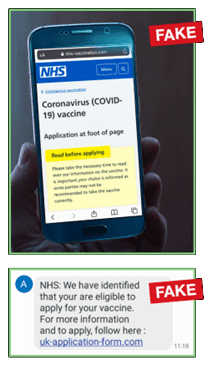This news roundup talks about:
- Vaccine Frauds,
- Warm & Toasty Newsletter,
- Train As a Healthcare Support Worker,
- Essex Family Support Service e-Bulletin,
- Fake National Insurance Calls.
COVID-19 Vaccine Fraud

Criminals are using the COVID-19 vaccine as a way to target the public by tricking them to hand over cash or financial details. They are sending convincing-looking text messages letting people know they are eligible for the vaccine or phoning people directly pretending to be from the NHS, or local pharmacy.
People are warned to be alert to these scams. The NHS will NEVER:
- ask for payment – the vaccine is free,
- ask for your bank details,
- arrive unannounced at your home to administer the vaccine,
- ask you to prove your identity by sending copies of personal documents such as your passport.
Top 4 Vaccine Scams
- TEXT MESSAGES –
People are asked to press a number on their keypad or to send a text message to confirm they wish to receive the vaccine, doing so is likely to result in a charge being applied to their phone bill and fraudsters collecting personal information to use again. - PHONE CALLS
Victims receive a phone call from a fake caller offering the vaccine for a fee or asking for bank details - WEBSITES
Fake URL links to convincing-looking NHS vaccine booking forms, these look like official NHS forms and may contain some personal information already, at the end of the form it asks for their bank details. - IN PERSON
Fraudsters are calling unannounced at the homes of victims by pretending to be from the NHS to administer the vaccine there and then, in exchange for a cash payment.
Like Other Scams, the Same Advice Applies:
- Challenge – Could it be fake? It’s ok to reject, refuse or ignore any requests that don’t feel right. Check GOV.UK to ensure it’s genuine.
- Do not respond to text messages that try to get you to send money, or important personal information such as bank details or passwords.
- Use official government websites and refer to ‘Contact Us’ sections of websites to access information and service.
- Challenge unannounced callers to your home, NHS visits if necessary will be agreed with you directly or via carers, they will never turn up unannounced.
Who To Contact

- National Cyber Security Centre – forward fishy emails to [email protected].
- Action Fraud – if you think you might be a victim either call 0300 123 2040 of visit actionfraud.police.uk.
- CrimeStoppers are the ones to contact if you information you want to provide anonymously, either call 0800 587 5030 or visit covidfraudhotline.org.
Warm & Toasty Newsletter

This Warm & Toasty Club newsletter has been forwarded to us by CBC and includes 12 pages of stories, games, puzzles and things to do such as:
- Toy memories – a story from a different age of Hornby trains and collecting cards from cigarette packets.
- A discussion of the virtues of Lemon Drizzle versus Carrot Cake.
- TV Sitcom Quiz (Webmaster was rubbish, only 8 out of 10).
- Mini-bios by/about members.
- Memories of tea leaves, bedspreads and telephone boxes.
- Joke Corner.
- Wellbeing tips.
You can visit the club online at their website or on Facebook.
Train as a Healthcare Support Worker

If you are aged between 18 – 30 and currently not in education, employment or training this might be of interest to you. The Prince’s Trust, in partnership with Salutem Care & Education, and South Essex College, are offering the opportunity to become a Healthcare Support Worker. You can expect:
- Level 1 qualification in preparing to work in adult social care,
- Learn about the Healthcare Support Worker roles available including the key duties you will be responsible for.
- Receive tailored support to help you identify and demonstrate your key strengths and values, specifically for the Healthcare Support Worker roles.
- No impact on any benefits you might be in receipt of, and
- Six months mentoring support.
Places are limited for this online course (which runs from 22nd February to 12th March). If you are interested email [email protected]. Phone interviews will be conducted with applicants; there are vacancies in Colchester, Harwich and Tendring.
Essex Family Support Service e-Bulletin
Another 6 pages of reading encouraging you get the family out for fresh air, exercise and find the inner artist. It Includes information about a number of support services:
- Family Lives – offers emotional support and more,
- Young Minds – has advice to help parents deal with anxious children,
- Kooth – offering mental support for all ages,
- Adult Community Learning – with free high quality health & wellbeing courses,
- The MAZE Group – special needs support.
Click the link to view or download this PDF file.
Fake National Insurance Calls

Following a surge in reporting to Action Fraud, Essex has also seen an increase in automated National Insurance scams.
Residents have reported receiving an automated telephone call telling them their “National Insurance number has been compromised” and in order to fix this and get a new number, the victim needs to “press 1 on their handset to be connected to the caller”.
Once connected to the “caller”, they are pressured into giving over their personal details in order to receive a new National Insurance number. In reality, they’ve been connected to a criminal who can now use their personal details to commit further frauds. Remember:
- STOP – Taking a moment to stop and think before parting with your money or information could keep you safe.
- CHALLENGE – Could it be fake? It’s ok to reject, refuse or ignore any requests. Only criminals will try to rush or panic you.
- PROTECT – If you have provided personal details to someone over the phone and you now believe this to be a scam, contact your bank, building society and credit card company immediately and report it to Action Fraud at www.actionfraud.police.uk or by calling 0300 123 2040.

